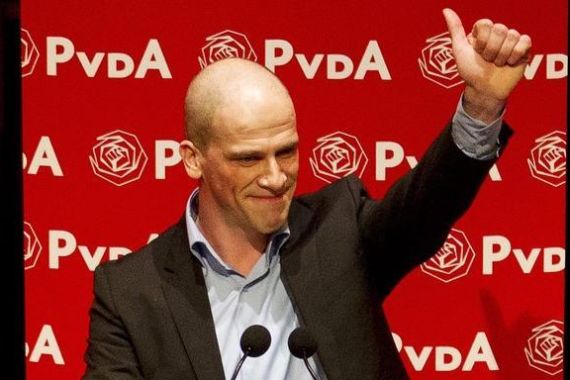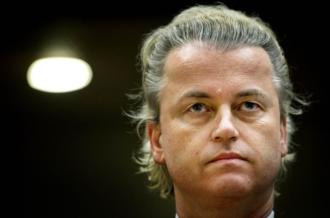Dutch election set to test EU popularity
Social Democrats and the Liberal party in close race in vote dominated by financial crisis and the EU’s role.

The Social Democrats and the Liberal Party in the Netherlands are in dead heat for Wednesday’s general elections that have been dominated by the financial crisis in Europe and the role of the European Union.
A poll released late Saturday shows that the Labour Party (PvdA) and the Liberal Party (VVD) will each win 35 seats in the 150-seat parliament, signalling a remarkable comeback by Labour Party leader Diederik Samsom.
It is the first poll that gives both parties an even chance of winning the elections and with that the right to appoint a prime minister and form a ruling coalition.
| More on the Dutch elections |
At the beginning of the campaigns, no one would have thought Samsom could be a threat to Prime Minister Mark Rutte (VVD), but the Labour Party leader, who had a particularly bumpy start in his new job, now seems to be more popular than his Liberal rival.
Only a month ago the PvdA faced sagging popular support, with polls not giving the party more than 19 seats in parliament.
But Samsom’s steady performance in the many televised debates over the past weeks have sky-rocketed his profile, leaving other left-leaning leaders of the Socialist Party and Democrats ’66 far behind him in the polls.
“I will either be prime minister, or I will lead my party in Parliament,” Samsom said last week, rejecting the possibility of a ministerial post if his PvdA finishes second.
Comeback Kid
Samsom, a 41-year-old former Greenpeace activist, is generally seen as an idealist. He was arrested several times for his work for the environmental group, but he does not have a criminal record.
He only took over the Labour Party leadership in March, shortly before Rutte’s government collapsed over disagreements with their coalition partners about how to implement austerity measures.
Andre Krouwel, a political scientist at Vrije University in Amsterdam, told Al Jazeera that Samsom has led an uncharacteristic, American style campaign, featuring a political ad portraying him as a family man, caring for his handicapped daughter and bringing his son to school.
“This personal approach to politics is very un-Dutch. It was all styled around the previous Obama campaign where “Change” was promised, without saying exactly what kind of change they have in mind,” Krouwel said.
 |
| Analysts say Prime Minister Mark Rutte is seen a one-dimensional character as he keeps his private life out of the public domain [AP] |
The campaign advertisement where the candidate carries his daughter “does not carry a single political position”, the professor said. “This carefully crafted image of a sympathetic family man contrasts sharply with the one-dimensional Rutte, who is single and keeps his private life to himself.”
The disciplined campaign and the move to introduce his family to the electorate seems to have paid off, as many now view him as more sympathetic than Rutte and other party leaders.
Samsom’s PvdA has been campaigning heavily on its plans to tackle the sovereign debt crisis by investing in targeted projects aimed to stimulate the economy. But listening to the general message of his campaign, it remains unclear which measures he will take to turn the economy around.
“The last elections in 2010 were all about specifics, to the point that party leaders even debated the price of a carton of milk. Job Cohen, the previous Labour Party leader, ingloriously perished in that debate. So, they learned from that and this time around, they only proclaimed a general direction, not saying anything specific out loud, referring to the party programme for details,” Krouwel said.
“If there is one message that the PvdA sends out it is; ‘We all have to suffer in these difficult times, but we will make sure that the suffering is equally divided.’ That has appealed to many voters on the left, especially with those of the Socialist Party. If these left wingers now conclude that they can get rid of Rutte’s VVD by crossing over to the Labour Party, the PvdA could easily win these elections.”
Wilders’ shifted message
As most attention went to the meteoric rise of the PvdA, Geert Wilders’ Freedom Party remained somewhat of an outsider during the campaign, but could still come out stronger after these elections.
Realising that many of his followers were getting tired of his constant anti-Islam rhetoric, Wilders has shifted the focus of his message to a dark warning about what he calls “the dangers of Europe” and the “profiteers in the European parliament”.
 |
| Anti-immigrant politician Geert Wilders shifted the focus of his message to a dark warning about Europe [Reuters] |
He pushed himself to the background by campaigning with sharp anti-Europe rhetoric and unpopular ideas about leaving the eurozone.
Wilders walked out on the previous government, saying he was not willing to support any austerity measures that would save more than 20bn euros ($25.5bn). He also refuses to move on other issues like the housing market, pensions and the labour market, which means it would be difficult to come to an agreement with the PVV when coalition forming starts.
“His extreme views about the EU and the euro – his longing back to our previous currency, the guilder, scares many people. He used to be the candidate that said: ‘Your pension is safe with me.’ But with his proposals of leaving the eurozone he is asking his followers to jump off a cliff, because that will only create more uncertainty,” Krouwel said.
When the votes are counted on Wednesday evening the complicated process of coalition forming will begin, even though many analysts believe the deal making between the Liberals and the Social Democrats has already started behind closed doors.
When the dust settles after the vote and if the PvdA and VVD do come out on top, they could very well end up in a coalition together, backed by one or two smaller parties.